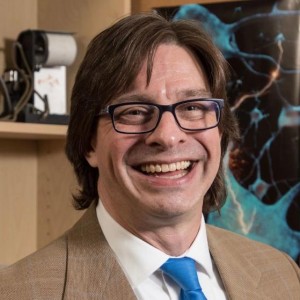PLU Psychology Professor Regarded as a Pioneer in Crowdsourcing Science

By Pacific Lutheran University
TACOMA, WASH. (June 27, 2019) — Dr. Jon Grahe's reach extends around the globe as an open science ambassador. Nearly a decade ago, Dr. Grahe declared that he wanted to change how we study social science. Because of his tireless efforts, a new approach to conducting research and training students is underway.
For over 20 years, Dr. Grahe taught research methods, statistics and capstone courses (e.g., senior research projects and theses) at Monmouth College and Pacific Lutheran University. During this time, he recognized that students could learn research methods and contribute to social science concurrently, with results disseminated beyond his classroom. Dr. Grahe’s desire to improve psychology students’ training and educational experiences, as well as the method in which social science data are collected, analyzed and discussed, resulted in the launch of two groundbreaking projects: the CREP (Collaborative Replications and Education Project) and the EAMMi2 (Emerging Adulthood Measured at Multiple Institutions 2: The Next Generation).
To understand how student training, the CREP and the EAMMi2 are related, a brief discussion of open science is imperative.
What is Open Science, and Why Does it Matter?
Open science strives to make research transparent and accessible, often using large, collaborative networks. To accomplish this, research methods, materials and data are shared digitally around the world to tackle inquiries. Why is this important? Traditional research can yield low replicability of previous studies. This suggests—in part— questionable research practices, including manipulating data to fit hypotheses and desired results, or worse yet, data fabrication. A “replicability crisis” (i.e., the inability to replicate earlier research findings), is addressed with open science practices. Benefits of open science include preserving the integrity of research through more accurate replication and validation of results, as well as conducting more studies with one vast, rich data set. Inclusion of international participants and easier collaboration with colleagues across the globe also advance science.
The Role of Students
For years, Dr. Grahe recognized that undergraduates are uniquely positioned to contribute to science in meaningful ways.
“The era of meta-science using crowdsourcing has arrived,” he explains. “Imagine research students from around the country conducting their independent and senior capstone research projects. The data could be submitted to a web-portal that you could freely access and analyze. With over 100,000 seniors graduating nationally across the U.S. with a psychology major, and at least 25 percent completing a research project including some kind of empirical data collection, even a meager participation rate would yield a wealth of research that could immensely benefit the field of psychology.”
Dr. Grahe’s enthusiasm extends beyond simply testing competing theories within psychology, however.
“Consider the benefits for undergraduate and graduate student training in quantitative methods accessing data representing diverse projects from multiple institutions across broad geographical regions,” he said.
The Collaboration Replications and Education Project (CREP)
CREP (rhymes with “grape”), whose mission is to improve undergraduate training through crowdsourced replication, was created in 2013 by Dr. Grahe, Hans Ijzerman and Mark Brandt. In brief, students attempt to replicate earlier, highly cited studies that are feasible to complete as part of their courses. Students are guided through the process and receive CREP approval by demonstrating transparency in their research. Once enough data have been collected from multiple sites, results are pooled and contributors are encouraged to collaborate on a research paper for publication. In addition, outside investigators may utilize the CREP for meta-analyses and their own research interests. As Dr. Grahe explains, “The advantages relate to both pedagogy and theory in psychology.”
Dr. Jordan Wagge, who recently assumed the role of Executive Director of the CREP, described Dr. Grahe’s role in the open science movement as an advocate and educator.
“He’s been a tremendous force behind open science and crowdsourcing. He is also a significant actor in getting journals to adopt badges for open science practices and many other crowdsourcing initiatives,” Dr. Wagge said. “He’s been an early adopter of many open science practices, a steadfast supporter of, and Ambassador for, the Center for Open Science, and an enthusiastic open science educator and mentor.”
Dr. Chris Chartier, Director of the Psychological Science Accelerator (a broadscoped, crowdsourced project), has collaborated with Dr. Grahe and is also quick to recognize his contributions to the field.
“Jon has been a champion of both replication efforts and training the next generation of scientists. He was the primary driver of the CREP initiative, which pairs high-quality replications with student researcher training and supervision. It’s an amazing project that accomplishes both scientific and pedagogical goals simultaneously,” Dr. Chartier said. “He also brought open science practices to the Psi Chi journal, introducing badges for open data, open materials, pre-registration, and replication, again introducing new scientists in training to current best practices.”
Emerging Adulthood Measured at Multiple Institutions 2: The Next Generation Project (EAMMi2)
In 2016, Dr. Grahe organized a comprehensive collection of measures on a survey for the EAMMi2 (building on the original EAMMI). One goal was to generate rich, large-scale data to answer research questions related to Emerging Adulthood, or the period between ages 18-29 when individuals transition from adolescence to adulthood. An additional objective was to compile a data set that instructors could utilize for statistics and research methods courses for years to come. More specifically, Dr. Grahe reports that the EAMMi2 is a diverse data set available for free that can be used to demonstrate examples or practice activities for almost any undergraduate or graduate statistics courses. In the spirit of open science, data sharing, and advancing the field, students are encouraged to present their work at conferences or submit for publication.
Final Thoughts
It may be premature to reflect on Dr. Grahe’s legacy; however, he feels particularly proud of one aspect of his career.
“I think it is the vibrant network of research that I created with zero operating budget in the case of CREP, and two tiny grants in the case of the EAMMi2,” he said. “Both of these projects offer much potential for current and future students and faculty, not only at PLU, but also for students and faculty across the world.”
Dr. Chartier agrees, but also appreciates the support Dr. Grahe offers to his students and colleagues: “More than anything else, Jon has a contagious enthusiasm and passion for improving psychological science and giving others the tools they need to do the best work they can do.”



